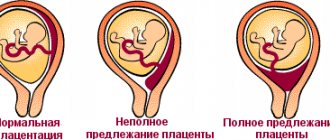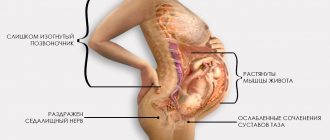Stress is not a specific reaction of an individual to the action of external or internal factors. Failure to cope with threats and problems causes the body to respond psychologically and physically. A person experiences panic attacks, a feeling of inexplicable anxiety. The heartbeat, sweating accelerates, the body begins to tremble, and there is shortness of breath. All these symptoms can either appear suddenly or develop gradually. A pregnant woman, as a result of changes in hormonal levels, is already subject to some drastic changes in life. Her body, life views, familiar living conditions - all this is undergoing drastic changes. And she cannot always cope with herself, even knowing about the threat to the fetus. Stress during pregnancy is quite common.
Fear has big eyes
“Fears live in us and are part of the work of intuition and self-defense,” says Yulia Plotnikova, lactation consultant, perinatal psychologist, doula and mother of four children.
Julia is sure: fears are born from ignorance.
A person is afraid when he does not feel his body, does not know the principles of its work.
— If we do not hear simple signals from the body to change the environment and rhythm of life, this will be followed by the body’s natural reaction to discomfort. Tension, a surge of adrenaline and, as a result, a mental disorder, its release from a balanced endorphin-oxytocin state.
Let's imagine: we sit at the computer all day in one position. The body becomes numb, tired, and the rhythm of its blood circulation is disrupted. The first, often unnoticeable signals are stabbing sensations, discomfort in the body, which we already feel when we straighten up and move away from the computer. Often we repeat the same thing for weeks until we are completely exhausted, and the body throws up mild unpleasant sensations. If we don’t stop and do exercises, jogging and other useful activities, then depression, disappointment, illness, and fears will follow in a logical chain.
It's the same with emotions. If we are in a negative emotion for a long time, this is fraught with the appearance of depression.
Fear helps save us from ourselves, it doesn't just appear. It is important to figure out why you need it and what part of yourself is important to develop so that the worries disappear.
Fear creates tension and a surge of adrenaline, it does not allow you to think calmly, it leads to dead end and numbness.
This is a vicious circle: the more we are afraid, the more tense we become and again we are afraid of unpleasant sensations in the body. As a result, the likelihood of stumbling upon what we fear increases. Isn't it easier to understand yourself? Therefore, it is important to develop carefully and evenly in all areas: physical, intellectual and emotional.
Ultrasound for frozen pregnancy
An earlier ultrasound examination is prescribed if pregnancy is suspected to be fading. This diagnostic method is highly informative and helps to promptly identify or confirm suspicions of embryo death in the womb.
Each gestation period has certain parameters for fetal development. Based on these indicators, the doctor examines the image obtained through the sensor and draws his own conclusions about the condition of the fetal egg and its viability. Any discrepancies indicate deviations from the norm and pathology.
In the early stages of pregnancy, the volume of the uterus, which is smaller than it should be during the established period of gestation, can tell about TB. In some cases, a frozen embryo is not clearly displayed on the monitor, while a deformed fertilized egg has blurred contours and adhesions and bridges are visible in the picture. Signs of fading also include oligohydramnios and uncharacteristic changes in the structure of the placenta.
In the 2-3 trimester, the fetus is almost formed. The death of the embryo during this period is confirmed by ultrasound due to the lack of motor activity and heartbeat. Pathology is also indicated by an abnormal position of the body, a drooping jaw, discrepancy in the outlines of the skull bones, a clearly visible deformation of the chest, and a pathological change in the spine.
"I'm afraid to give birth"
Perhaps one of the most common fears of an expectant mother. The situation is aggravated by detailed and emotional stories from friends, as well as numerous forums on the Internet, where mothers are happy to share their impressions and tell what the pain during childbirth can be roughly compared to.
Let's figure out why you shouldn't be afraid. Firstly, if it were so hellishly unbearable, not a single woman in the world would dare to give birth to a second child, you must agree. You are not the first and you are not the last: your mother, grandmother, older sister, friend and millions of other women around the world have gone through this. So you can do it too.
Secondly, during childbirth, a woman’s body actively produces endorphin hormones. They have a mild analgesic effect. If the pain becomes unbearable, doctors may recommend the use of anesthesia, which will alleviate the condition.
Third, don't forget that pain is your friend, not your enemy. It is pain that helps in the process of childbirth, it signals that everything is going according to plan, tells you how the process is going and what needs to be done at the moment.
Remember that this difficult task is difficult not only for you, but also for the baby. And your main task is to do everything so as not to harm the child.
Therefore, trust the advice of medical personnel and study the issue of childbirth in advance. You must know what is happening to you, then giving birth will be much easier. And when you see your long-awaited baby, believe me, all the memories of the painful process will disappear, because all this will no longer matter at all.
- If you are afraid to give birth, understand whether you know enough about this issue. Do you have enough knowledge about physiology, pregnancy psychology, perinatal psychology? If not, go to experts, body and breathing practices,” comments psychologist and mother of many children Yulia Plotnikova.
Discharge during frozen pregnancy
Bloody or brown discharge during pregnancy may signal the death of the embryo. During a frozen pregnancy, pathological leucorrhoea is distinguished by a viscous consistency, small volumes, an unpleasant odor and is accompanied by nagging pain in the lower abdomen.
Discharge can warn of developing infection, inflammation, and that the fetus has begun to decompose. At the first symptoms, you must urgently contact a gynecologist, who will prescribe the necessary diagnostics.
"I don't know how to deal with small children"
If a woman is expecting her first child, she will inevitably be bothered by many questions. The baby is so tiny, fragile, defenseless. What if I drop it? Am I going to accidentally break something for him? What will I do if I can’t calm my baby down or don’t understand what’s bothering him at the moment?
The main answer is: don't panic. Do you remember the first time you came to school, in first grade? It was very exciting, scary: you didn’t know what awaited you, whether you would like the new stage of life, whether you would make friends with your peers and teachers. But day after day you came to school, communicated, learned new things, made mistakes, made new acquaintances, were happy and disappointed. Everything turned out to be not so scary: I just needed to overcome my fear and gain experience.
The same is true in the situation with the appearance of a baby in the family. The experience that you will receive every day, the support of loved ones, the advice of specialists - all this will definitely help you.
— If you are afraid of not being able to cope with your baby, imagine yourself as a newborn: what were your needs, and still are, what would you really want, being on the changing table and with a pacifier in your mouth? Love, mother's warmth, breasts, security.
To this knowledge, it is important to add the physiological needs of the baby: the work and development of the brain, shallow sleep, during which the baby’s brain develops, reflexes, with the help of which the child’s emotional satisfaction is achieved. The prenatal and newborn baby has a strong sense of his mother's environment and world. They are very dependent on the “weather” in my mother’s head,” says Yulia Plotnikova.
What tests show a frozen pregnancy?
The main laboratory test that can determine the fading and death of the fetus is human chorionic gonadotropin or “pregnant hormone hCG.” This hormone is responsible for regulating hormonal processes during pregnancy.
The element is produced by the syncytiotrophoblast, which is a component of the fertilized egg. After the fertilized egg has attached to the uterine wall, hCG begins to stimulate the formation of the placenta.
In some cases, the analysis is performed to determine cancer. By comparing hormone levels at different stages, a specialist can diagnose an ectopic pregnancy or fetal death.
The test is taken in the morning on an empty stomach or during the day, taking into account that the last meal was taken at least five hours before the procedure. The patient should be warned about taking medications. Results can be obtained the next day after donating blood from a vein.
“I will become uninteresting to my husband as a woman. We won’t have any time for ourselves at all.”
Having a baby inevitably comes with changes. The usual way of life of the spouses is changing. If earlier you could break away and go to a neighboring city for the weekend, watch movies in the evenings, serenely drinking wine, now you have to change everything.
The baby is now the center of your little universe, and this is absolutely normal.
Some parents are not ready for such drastic changes. Selfishness takes over, and a young mother can be seriously worried about this. “I will always be tired and exhausted, my husband will definitely start cheating. We will no longer be able to go to the cinema together or have luxurious romantic evenings,” such thoughts can torment a pregnant woman.
- The development of this fear can be prevented if you overcome the previous fear: the fear of not being able to cope with the baby. Having established a warm relationship with your baby, it will be easy for you to lead everyday life and raise your child in a calm atmosphere. The baby’s calmness directly depends on the mother’s psycho-emotional state. Here, specialists in the field of breastfeeding and motherhood, doulas who accompany during childbirth and postpartum techniques for self-recovery are here to help mothers.
The long-awaited baby unites the whole family with the most joyful emotions. He is a continuation of his parents, who, with the arrival of their first child, feel like a “real family.” And often, in order to devote time to your loved one - to show that you love and appreciate him - it is not at all necessary to cook a lot of dishes, for example. Believe me, men value in their wife the woman herself with the ability to be affectionate, kind, and sensitive,” says the psychologist. Yes, your life will change, but getting out of your comfort zone is simply necessary for every person to develop and succeed.
Think positively: you will soon be a real full-fledged family, you will see a small copy of yourself and your loved one, give the gift of life and experience the joy of motherhood.
And there will definitely still be joint trips to the movies and karaoke clubs. Firstly, the baby has grandparents who will be happy to sit with him. And secondly, you yourself will not notice how the baby grows up and becomes more independent. You will also miss those times when the little one snored peacefully under his side and did not allow you to leave him for a minute.
— Travel, constantly learn, develop. Now there are so many interesting events for young mothers - just choose, recommends psychologist Yulia Plotnikova.
How to choose a perinatal psychologist
A woman needs to take a responsible approach to choosing a specialist. Pay attention to the specialist’s education, reviews of him, whether he has modern knowledge in the field of psychology, but one of the most important indicators is trust, so that you feel his support and attention, so that you feel comfortable working with him. For those who are interested in the field of perinatal psychology, we can recommend our course “Practical Perinatal Psychology. Social and psychological support of pregnancy, childbirth and the postpartum period."
“I’m afraid of toxicosis, back pain and other changes in my body”
Psychologists advise: it is important to learn to feel and understand yourself. Of course, there will be changes in the body: a new life is born in you! But there are different ways to deal with mild morning nausea, increased appetite and weight gain.
- Toxicosis is given to gradually prepare a woman for changes in her life - motherhood. And in many ways it is giving, receiving, flexible, sensitive. Toxicosis helps a woman develop humility and the ability to adapt to illness. To understand how her body will be more comfortable, despite the unpleasant sensations: what and when to eat, when to lie down, ask for help or lie down next to her husband. This is the development of sensitivity.
During pregnancy, wonderful changes occur in a woman’s psyche and body. This is the state of a “growing mother”. And if a woman accepts this, she blossoms and radiates. Such a woman knows how to see herself as beautiful, she is happy, and everything comes relatively easily to her. She does not stand still and develops: she does yoga, gymnastics or goes to the pool, eats right and therefore does everything to be in good shape. She does not reproach herself for the fact that some changes in her body are inevitable, but this will not make her feel less beautiful, says the psychologist.
Which doctor and how does he determine a frozen pregnancy?
If there is a suspicion of a frozen pregnancy, the woman is recommended to consult a gynecologist who will conduct an objective examination of the patient, prescribe a blood test for hCG, and determine the reduction of the uterus.
In addition to laboratory examinations, an ultrasound examination is prescribed, which will show the arrest of fetal development and the absence of heartbeat and motor activity.
Methods for diagnosing gynecological diseases:
- Calling a gynecologist to your home
- Diagnosis of gynecological diseases
- Diagnosis of sexually transmitted infections in women
- Colposcopy
- HCG tests
- Ultrasound during pregnancy
- Pelvic ultrasound
- Diagnosis of sexually transmitted diseases
- Fetal ultrasound
- Ultrasound of the mammary glands
- Ultrasound during pregnancy
- Transvaginal ultrasound
- Ultrasound of the ovaries
- Ultrasound of the uterus
- Cervical smear
- Vaginal smear
- Hormone tests
- Tests for sexually transmitted infections
“I’m afraid that I will have a sick child”
This is a serious and sometimes not unfounded fear. However, it is one thing to wish with all your heart the birth of a healthy child and do everything so that the baby develops well. And another thing is to worry day and night to the point of hysterics and tears, without having any reason for it.
Of course, this may sound corny, but think optimistically. No one will be better off because of your depression, especially your child. Give up bad habits, go for walks and go to the pool, watch good and funny films, and, most importantly, follow all the doctor’s instructions. Everything will definitely be fine!
— The fear of having a sick child is justified, but it is worth remembering that the nascent life is built even before the birth of the baby, the first growing cells of the baby at the morphogenetic level record all the events, feelings, and emotions of the mother. Therefore, I encourage women to be more conscious and work on themselves. Those who understand how important positive emotions and joy are in the development of a new life.
Cleaning during frozen pregnancy
Cleansing the uterine cavity is a surgical procedure that is performed under general or local anesthesia. Before the operational event:
- analysis for hCG, syphilis, hepatitis, HIV;
- cardiogram;
- ultrasonography;
- general smear examination;
- coagulogram.
Gynecological cleansing is mandatory in the early stages, unless a spontaneous miscarriage has occurred. If medical aspiration fails. For periods of more than 8 weeks, the procedure is necessary even in case of spontaneous miscarriage, since fragments of the fetus may remain in the uterus, which will lead to inflammatory processes and blood poisoning, which is fraught with dangerous complications and death.
Medical aspiration is the most gentle, but not the most effective method of abortion. A woman, under the supervision of a gynecologist, takes a special pill that causes contractions of the uterus, during which the body independently pushes out the dead fertilized egg. Unfortunately, this method does not always lead to the expected effect.
In addition to medication, there are two types of cleaning: vacuum and surgical. In the first case, special vacuum equipment is used, which gently separates the fertilized egg from the walls of the uterus. This method has a minimum of side effects and a short rehabilitation period. Vacuum aspiration is less traumatic and rarely leads to infertility and complications.
A surgical abortion is performed using forceps and a curette, which crushes the embryo to effectively remove it from the uterine cavity. The fetus is practically scraped out, which can negatively affect the condition of the uterus.
Often, after such an intervention, inflammatory processes develop, and there is some risk of infertility. After curettage, some time is required for recovery, additional treatment and regular visits to the doctor, who will monitor the patient’s condition for a certain period.
“I’m afraid of harming my unborn baby by doing something wrong”
“The fear of harming the intrauterine baby is a good fear,” some experts believe. Worried about the baby, a pregnant woman takes care of herself and strives not to harm the future baby. But a sense of proportion is important in everything: you shouldn’t be too careful. Pregnancy is not a disease, so you can lead your usual lifestyle, with only some restrictions.
In addition, the baby is reliably protected by the placenta and amniotic fluid. Nature has done everything to make sure that it is not so easy for the baby to be seriously harmed.
— It is important during pregnancy not to be afraid of activity and vigor. Of course, being pregnant is a burden. It is often physically difficult. You need to correctly distribute the load and be able to feel what your body needs and when to stop.
Again, a positive attitude is very important. Thanks to it, many ailments, fears and even complications can be avoided. A healthy mind means a healthy body. Rejoice, believe, engage in self-development and love. Take care of yourself and your loved ones, and everything will be fine, I promise you this,” says psychologist Yulia Plotnikova.
Let’s add to the specialist’s words: remain optimistic, live a rich and active life, don’t withdraw into yourself and smile more often. Then you won’t be afraid of any phobias.
Cover illustration: Nikolai Korolev.
- share with your friends!
Experts: Yulia Plotnikova
Risk group
Women at risk of developing a frozen pregnancy are those who:
- had abortions;
- have crossed the threshold of 35 years;
- suffered an ectopic pregnancy;
- differ in the anatomical features of the structure of the reproductive system;
- abuse alcohol, smoke, have drug addiction;
- suffer from certain diseases: diseases of the heart, circulatory system, kidneys, liver, diabetes mellitus, gynecological pathologies, infections and of various origins.
Freezing also often occurs in patients with menstrual irregularities and hormonal imbalances. With the right approach and timely treatment, in most cases the prognosis can be favorable.
The main thing at the pregnancy planning stage is to contact a qualified specialist in time.
How to properly prepare for the next pregnancy after a frozen one
After pregnancy fading, it is important to determine the cause of the pathology that occurred and, if possible, eliminate it. When planning a subsequent conception, it is important to restore hormonal levels and normal physical condition, in which the uterus will be ready to accept a new fertilized egg.
After freezing during pregnancy planning, it is recommended:
- lead a healthy lifestyle;
- eliminate large, debilitating loads;
- in case of severe psycho-emotional stress, take a course of sedatives, preferably herbal ones;
- carry out antibacterial therapy;
- visit a gynecologist regularly;
- take hormonal contraceptives for at least three months.
If serious illnesses are detected, it is important to undergo full treatment and follow all doctor’s recommendations. If freezing occurs again during a second pregnancy, it is necessary to look for the causes of the pathology and only after it has been eliminated, prepare for the next pregnancy.
During the rehabilitation period, it is advisable to walk a lot, take vitamin and mineral complexes, give up alcohol, smoking, and especially taking drugs. The psychological attitude is also important during this period, since the result of recovery depends on a balanced psycho-emotional background no less than on taking medications and other therapeutic measures.
The first examinations of the patient are scheduled immediately after cleaning. The fetus undergoes histological studies, which are necessary to identify genetic abnormalities, mutations, and anomalies. The examination also indicates the presence of infections, inflammations and other diseases in a woman. You can plan a subsequent conception only with a qualified doctor, after his permission to do so.











